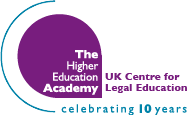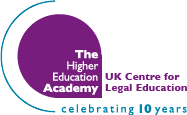UKCLE monitoring and evaluation
UKCLE evaluation 2009-10
The UKCLE evaluation strategy aims to reveal the extent to which UKCLE has been successful in enhancing learning and teaching in law. Qualitative and quantative data is collected against the Higher Education Academy evidence of success framework on an ongoing basis. In addition, we have commissioned external evaluations of our activities.
The focus of our evaluation work during 2009-10 was the Learning in Law Annual Conference 2010. It was conducted by David Baume, external consultant, and his report can be downloaded at the bottom of the page.
Previous evaluations
UKCLE evaluation 2003-04
In 2003-04 an external evaluation of UKCLE activities was undertaken by James Wisdom, independent consultant and a valued ‘critical friend’ of UKCLE. The aim of this evaluation was to build on what we know about the extent and reach of UKCLE activities in impacting upon learning and teaching practice in law, in particular the factors affecting reach across sectors and regions, and to highlight ways in which UKCLE can refine its activities so as to maximise impact.
The evaluation was conducted in two phases, involving a combination of face to face and telephone interviews, focus groups with heads of department, law teachers, LILI members, representatives from regional institutions and, last but by means least, students.
Phase one involved six pre-1992 universities and aimed to explore attitudes towards teaching, learning, assessment and curriculum development. In particular we sought to understand why UKCLE receives a lower demand for its services from research-led universities compared to other universities, and how we might develop and deliver an appropriate service to staff in these law schools.
Phase two involved six post-1992 universities and aimed to explore whether UKCLE work impacts upon the quality of student learning. It was also aimed at helping us to develop future plans and ensure that our work continues to be relevant and of high quality. Download the full reports and an executive summary below.
UKCLE evaluation 2002-03
The aim of the UKCLE evaluation for 2002-03 was to begin to tease out factors that influence change in learning, teaching and assessment practice and to lay the foundations for more detailed evaluation work in 2003-04. 12 law schools were invited to respond to questions about the extent to which a UKCLE intervention had impacted on learning and teaching practices, and how far this change had been promoted or extended within their department.
Responses indicated that UKCLE is having most impact through roadshows. There was some evidence that the interventions were impacting upon teaching, with changes being made to ICT and assessment policies and new methods, such as small group teaching and criterion referenced assessment being introduced. There was also an indication that change is spreading beyond those immediately involved in the department.
As might be expected, key individuals had a significant impact on change. In those departments where the head of department attended UKCLE events and actively encouraged discussion about pedagogy there was evidence of change taking place. Other staff with responsibility for learning and teaching claimed that they felt UKCLE work would result in changed practice, but that this was not yet evident.
The evaluation revealed that another key factor affecting change and take up of innovation is departmental context and culture. What works in one law school may not work well in another due to politics, resources and departmental ethos. UKCLE can offer a useful role in providing examples and encouraging a cross-fertilisation of ideas, but in order to change attitudes and practice the staff in the department need to take ownership of the innovation and put their own particular spin on it.
UKCLE evaluation 2001-02
An external evaluation of UKCLE’s work was carried out during 2001-02 by a team from the Institute for the Advancement of University Learning (IAUL) at the University of Oxford, with guidance from our two evaluation consultants, Lewis Elton and William Twining of University College London. The IAUL evaluators’ final report (available to download below) was published in June 2002.
The purpose of the evaluation was to assess the impact of UKCLE on the legal education community by xamining law teachers’ perceptions of the Centre and its activities. A selection of interviews was conducted with members of the legal education community and an e-mail questionnaire was distributed through relevant mailing lists.
84% said they were aware of UKCLE and its work. Respondents were very positive about their experiences of working with the Centre, describing their relationship with UKCLE as “easy and comfortable”. Staff members were described as “hardworking” and “interested and enthusiastic about research and good practice in legal education”. The Centre was also praised for working sensitively with other organisations and groups in legal education. UKCLE outputs were generally well received, with the results indicating satisfaction with the newsletter, publications, the website and events programme. A pleasing 48% of respondents stated that the services offered by UKCLE had had an impact on their practice. On the negative side, some respondents felt that UKCLE “preaches to the converted”, is more relevant to new rather than old universities and is too focused on the individual law teacher at the expense of the needs of departments.



Comments
There are no comments at this time